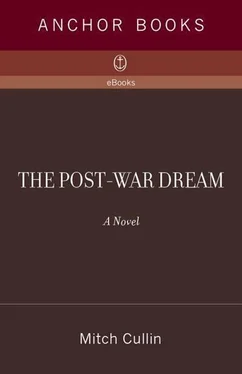Hollis belonged to the latter category, for that single shot from a Japanese-built rifle had rendered him useless, something he finally understood at Yokosuka when the bandages were changed — the gauze unfurling down the length of his left thigh, slowly displaying the extent of his injury and its repair. What he had imagined as a dime-shaped perforation was, in fact, a seventeen-inch scar after surgery was completed, with a sizable gash indenting a portion of his thigh so deeply that it looked as if the skin had collapsed into a cavernous sinkhole of discolored flesh. At some future point, he was told by a nurse, the indention would decrease, the scar would thin out. Another forecast came from a pair of young doctors — Dr. Golding and Dr. Buchman — who sat in chairs on either side of his bunk. Both similar-behaving, deadpan-voiced men leafed through files and sheets of notes while they took turns speaking, concluding a prolonged rehabilitation was in store for him, a period in which Hollis would have to use a wheelchair, then crutches, then a cane, then — if all went well — his own two feet.
“They should have you up and walking by Thanksgiving,” Dr. Golding assured him, nodding at Dr. Buchman. “You'll be in good hands.”
“Very good hands,” Dr. Buchman concurred, nodding at Dr. Golding.
“That's right, very good hands,” Dr. Golding agreed, nodding at Hollis.
“You got lucky, private.”
“Very lucky.”
But it was a high-strung, energetic corpsman nicknamed Sparky — a third-class petty officer, a wiry reservist, a choir director back in the States, somewhat of a dandy — who let Hollis know how lucky he had really been, lucky because he hadn't lost his leg: “Take it from me, I've seen plenty of boys brought here lacking all kinds of body parts, and they were still in better shape than you are.” In fact, Sparky had taken an interest in several of the quieter patients — ”the sweet ones,” he called them — and managed to learn about their individual conditions in detail, doting on them even when the attention wasn't required or wanted, eventually gaining their trust with an overly generous dispensation of barbiturates and a relentless sense of humor. For the patients whose faces and eyes were bandaged, Sparky delighted in teasing them, joking about the only two older nurses on the ward — veterans of World War II, women who had seen their share of the wounded — commenting to the men whenever one of the gray-haired nurses walked by, saying things like, “Oh my goodness, too bad you can't see this knockout. She's a vision of perfection. She'd make Elizabeth Taylor feel like Eleanor Roosevelt.”
It was Sparky, not the doctors or nurses, who first informed Hollis about his fate prior to arriving at Yokosuka — how his left femoral artery had been severed by the bullet and was ligated by doctors in Korea, his left foot having become cold and pale and lacking a detectable pulse, the drop of capillary circulation indicated by a delayed return of color upon a release of pressure from the skin; with edema also occurring, a couple of days had lapsed before it was decided the leg could be saved. “You came close to showing up here with just one boot, but you were probably too far gone to realize it.” Sparky discreetly pressed a painkiller against his palm. “Anyway, you really must do me a favor. While you're triumphantly tap-dancing again at Carnegie Hall, please remember me, would you?”
“That pretty much goes without saying,” replied Hollis, grinning.
“Good boy,” said Sparky, patting him on the shoulder. “We're all so proud of you.”
Hollis popped the barbiturate, chased it with a sip of water, and sank into the pillow — giving a sideways glance as Sparky about-faced on the heels of polished black shoes and flitted away, whistling happily between the rows of bunks, heading for another sweet one to comfort. Presently, while shadows crept along the floorboards and evening approached, he felt the induced fog settle across his slackened body like an ethereal weight, tiring him with ease. Hell of a way to quit smoking, was his last thought — and then he slept some more, not moving an inch, free of dreams or nightmares or any memories which bound him to such an ungaugeable present.
Later on, he was woken in darkness by a heaving cough, a throat being cleared. Overhead came a raspy voice, the Southern drawl of someone talking, mumbling from the top bunk which, hours before, hadn't been occupied. “Did you stop to think?” the voice asked, the tone languid and sluggish, medicated. “Did you stop to think to ask why it was we was fighting for? Did you stop to think to ask that? What'd it got to do with us? Did you stop and did you think?” But he hadn't heard the corpsmen bring in a new patient, hadn't sensed the rattling or shifting of the bunk as someone was made to lay above him. “Did you? Me neither. I didn't.”
The voice went on and on, repeating itself with alternating degrees of volume — a faint whisper, a sudden exclamation waking others.
“Will you shut up!” somebody cried from the adjacent bunks.
“Did you?”
“We aren't supposed to ask why,” somebody else responded nearby, “so shut the hell up!”
“Me neither. I didn't stop to think to ask. You didn't neither. You didn't stop to think to ask why neither. Did you?”
As the voice persisted, Hollis caught the strains of less disquieting creatures, hearing the purring of crickets just beyond the ward windows, communicating within the groupings of abundant weeds sheltering them. And if he believed it was possible to silence his noisy bedfellow with words, he might have brought up the insects and the weeds, mentioning how they never engaged in the wars of men. Perhaps, he wondered, that was why they were allowed to come back throughout the ages. People weren't afforded those kind of perfect rebirths. Individuals who died during war weren't destined to return as the exact same thing, thriving once more in the exact same place. Then he strained to perceive a vision of his own life long after his involvement in the war had ended — and, instead, saw the insects nestled inside the weeds, their shapes quivering securely among the hardy shoots, having claimed a home in an impossible world. It was a version of this sort of existence he would seek for himself, a methodical, consistent, and unburdened type of continuation — avoiding wearisome complications, unnecessary pain and, without doubt, steering clear of battles in which the outcome was uncertain or defied logic. He would take a page from the little things, from the things taken for granted and trampled underfoot. No, he wouldn't be reborn as the same old Hollis, but he would strive to be a more sensible, more prudent Hollis anyway — someone who would grow content with himself and his given surroundings, a man who believed he was done with war and pointless death.
“You do realize the war to end all wars wasn't,” Lon once said, when lounging by Hollis's swimming pool one evening. “Think we're always doomed to repeat ourselves? Are we just that pitiful?”
“Probably,” Hollis answered. Except, he thought, whatever comes along next won't be my war. It won't have anything to do with me. He'd paid his dues in the contextual name of freedom nearly five decades ago, and he had left Korea changed and resolved — becoming indifferent to what later loomed in Vietnam and elsewhere, having already recast the much earlier “war to end all wars” as a regrettable starting point rather than an emphatic, universally acknowledged conclusion.
“Sure, people go in circles,” Lon said, sighing as he spoke. “The important lessons keep getting taught, no one learns though, I guess.”
“You've got a real firm grasp on the obvious,” Hollis said, scratching at his navel. “Tell me something I don't know, could you?”
Читать дальше










![Theresa Cheung - The Dream Dictionary from A to Z [Revised edition] - The Ultimate A–Z to Interpret the Secrets of Your Dreams](/books/692092/theresa-cheung-the-dream-dictionary-from-a-to-z-r-thumb.webp)

